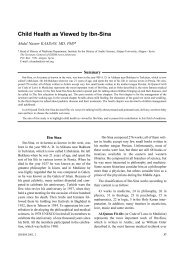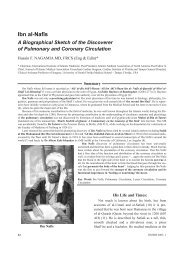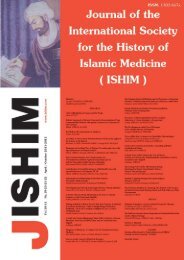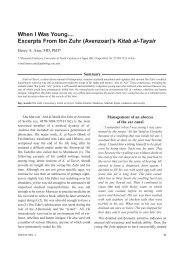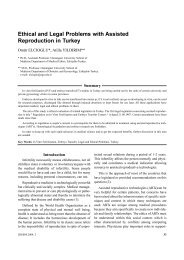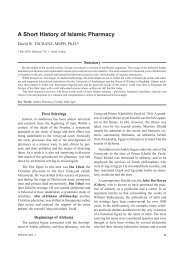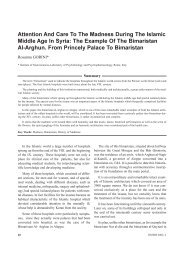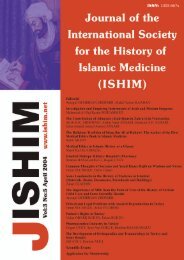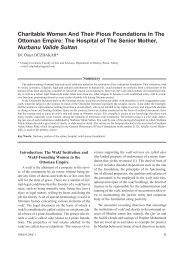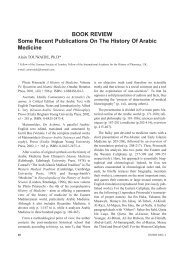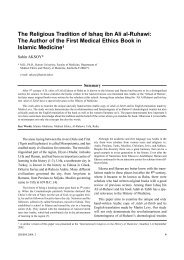Islamic Medicine History and Current Practice - International Society ...
Islamic Medicine History and Current Practice - International Society ...
Islamic Medicine History and Current Practice - International Society ...
- No tags were found...
You also want an ePaper? Increase the reach of your titles
YUMPU automatically turns print PDFs into web optimized ePapers that Google loves.
H. A. Hajar AL BINALI MAJNOON LILAlial dysfunction <strong>and</strong> even necrosis. Acute stress triggersmyocardial ischemia, promotes arrhythmogenesis,stimulates platelet function, <strong>and</strong> increases bloodviscosity through hemoconcentration. Acute stressalso causes coronary vasoconstriction.Hyperresponsivity of the sympathetic nervous system,manifested by exaggerated heart rate <strong>and</strong> bloodpressure responses to psychological stimuli, is anintrinsic characteristic among some individuals (6)Recently, chemical transmitters have been foundto be associated with romantic love. Platelet serotonin5-HT transporter in the early romantic phase ofa love relationship was found to be significantlylower than in the normal controls (7).Endocrinological investigations of the neurobiologyof attraction have found involvement of severalchemical processes. Several observations have highlightedthe role of monoamines <strong>and</strong> of neuropeptides,in particular oxytocin, vasopressin <strong>and</strong> opioids; butthis is only the beginning of the story. Love, the mosttypical human feeling, can be viewed as a dynamicprocess that represents the result of different componentsprobably sub-served by distinct neural substratesat different times. As such, some steps can beidentified, in particular its beginning, which is theprocess of attraction, followed by the attachmentprocess that, in some cases, can last forever (8).Love <strong>and</strong> digoxinFinally, the most fascinating finding of this year isthe involvement of digoxin in love <strong>and</strong> affection (9).The researchers found that the hypothalamus producesdigoxin. You fall in love because your hypothalamusproduces less digoxin. The human hypothalamusproduces an endogenous membrane Na+-K+ ATPase inhibitor, digoxin, which can regulateneuronal transmission. The digoxin status <strong>and</strong> neurotransmitterpatterns were studied in individuals witha predilection to fall in love. It was also studied inindividuals with differing hemispheric dominance tofind out the role of cerebral dominance in thisrespect. In individuals with a predilection to fall inlove, there was decreased digoxin synthesis,increased membrane Na+-K+ ATPase activity,decreased tryptophan catabolites (serotonin, quinolinicacid, <strong>and</strong> nicotine), <strong>and</strong> increased tyrosinecatabolites (dopamine, noradrenaline, <strong>and</strong> morphine).This pattern correlated with that obtained in lefthemispheric chemical dominance. Hemispheric dominance<strong>and</strong> hypothalamic digoxin could regulate thepredisposition to fall in love (9).I wonder how much love <strong>and</strong> affections of ourpatients with heart failure we ruined with digoxin! Ialso wonder if the passionate love or love sicknessthat afflicted Majnoon Lila could have been curedwith our once miraculous drug digoxin. In the historyof medicine, we have seen wonder drugs becomepopular, fade, <strong>and</strong> then “rediscovered” as wonderdrugs years later. Aspirin was such a drug. Whoknows, the historical drug, digoxin, might evolveagain to the wonder drug it once was.REFERENCES1.Ibn Sabia’: Oyoon Al Anba’ fi tabaqat al atiba’.(Arabictext)2.Freedman AM.Modern synopsis of comprehesive textbookof psychiatry. Lippincott, Williams & Wilkins, 1976: 610.3.Rosse, R: An Argument for Love Trauma Syndrome: AnImportant <strong>and</strong> Often Underrecognized Form of TraumaticGrief. [Online]. Perspectives. [2000, February 1].4.Rosse RB: The love trauma syndrome.Perseus Publishing,2001.5.Bartels A, Zeki S: The neural basis of romantic love:Neuroreport. 2000;11 (17):3829-34.6.Rozanski A, Blumental JA, Kaplan J: Impact of psychologicalfactors on the pathogenesis of cardiovascular disease<strong>and</strong> implications for Therapy Circulation. 1999; 99:2192 -217.7.Marazziti D, Akiskal HS, Rossi A, Cassano GB: Alterationof the platelet serotonin transporter in romantic love.Psychol Med. 1999; 29(3):741-5.8.Marazziti D, Cassano GB: The neurobiology of attraction.Endocrinol Invest. 2003; 26 (3 Suppl):58-60.9.Kurup RK, Kurup PA: Hypothalamic digoxin, hemisphericdominance, <strong>and</strong> neurobiology of love <strong>and</strong> affection. Inter. J.Neuroscience. 2003;11:721-9.8 JISHIM 2003, 2



